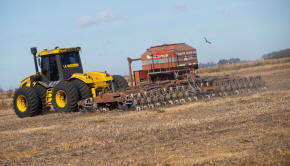|
The
truck driver protest over high fuel prices has paralyzed corn
and other grains exports just as the bulk of the harvest was
headed to ports for shipment to foreign markets.
Some protests, however, could continue since some smaller
truckers groups were not involved in the deal.
Argentina is the world's second biggest corn exporter, the top
exporter of processed soyoil and meal, as well as a major wheat
and beef supplier.
"Despite not agreeing (with a recent negotiation of truck cargo
rates) and taking into account the crisis that our country is
going through, we decide to lift the strike," one of the unions,
Autoconvocados Unidos, said in a statement.
The union described its decision as an act of good will.
The volume of trucks entering ports had already picked up on
Thursday, up some 70% versus a day earlier to reach over 1,500
vehicles, according to data from the Rosario grains exchange.
Rosario's ports are the point of departure for 80% of
Argentina's agricultural exports, most of which arrives in
trucks.
"It's getting back to normal," said Guillermo Wade, manager of
the country's maritime port chamber, referring to the ability of
trucks to access the port.
Also on Wednesday, the transport ministry agreed with some farm
and transport groups that were not involved in the strike to
hike grain freight rates by 25%.
But most protesting unions, including the UNTRA truckers union,
called the rate increase insufficient even as they mostly opted
to remove highway blockades.
"We have many more expenses than that," said UNTRA leader Carlos
Geneiro.
(Reporting by Maximilian Heath; Additional reporting by Nicolas
Misculin; Editing by Adam Jourdan, Nick Zieminski and Aurora
Ellis)
[© 2022 Thomson Reuters. All rights
reserved.]
This material may not be published,
broadcast, rewritten or redistributed.
Thompson Reuters is solely responsible for this content.

|
|





